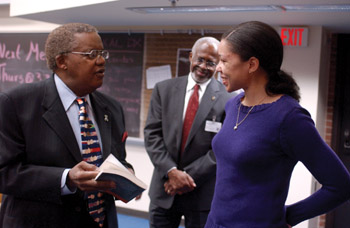
Dr. Henry Foster signs his book “Make A Difference” for Mary Fleming, a second- year medical student at Vanderbilt, after his lecture Wednesday afternoon. George C. Hill, Ph.D., associate dean for Diversity, looks on. Photo by Dana Johnson
Dr. Henry Foster offers solution to health disparities
Looking at the history of racial and ethnic disparities in health care, Dr. Henry W. Foster, Jr. described the medical inequities that have existed for African Americans for more than 400 years. Yet, he asked listeners to look beyond the past.
“History is not a goal, it’s a process. Newly gained historical knowledge should be a driving force to act — to think, teach and motivate,” said Foster, professor emeritus and former dean of the School of Medicine, Meharry College, and clinical professor of Obstetrics and Gynecology, Vanderbilt University. Foster spoke to more than 200 students, faculty and staff on Wednesday as the grand finale event of Black History Month.
Foster provided a historical overview of health disparities, demonstrated the magnitude of the problem today and offered intervention strategies for the future, which included education, a focus on wellness and prevention, along with exercising one’s right to vote.
“Racism is not about skin pigment and genetics,” he said. “It’s about power and control — and we have the tools to break this. We just have to use them.”
Foster is nationally known for his work in obstetrics and gynecology, having developed a national model for regionalized perinatal health care systems, as well as a teen pregnancy reduction plan that was named one of President George H.W. Bush’s “Thousand Points of Light.”
Foster’s lecture was sponsored by the Student National Medical Association and the Vanderbilt Office for Diversity in Medical Education.













